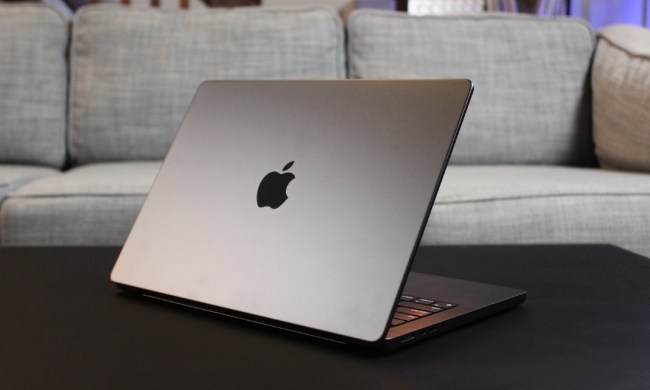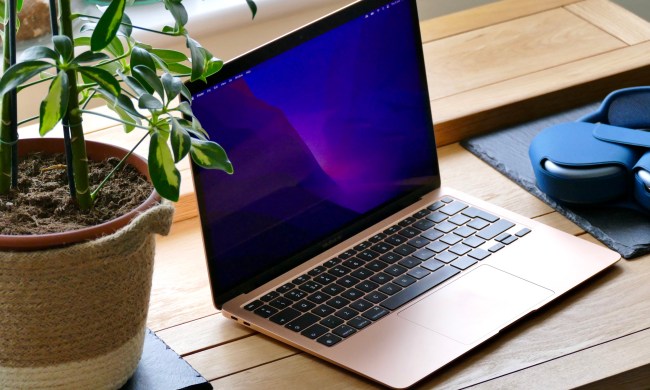Launched in late 2020, Apple’s M1 chips revolutionized its Macs by bringing about a seismic leap in performance and battery life. Now, a year later, Apple has launched not one but two follow-ups to that initial chip during the October Apple Unleashed event.
Dubbed the M1 Pro and M1 Max, these two Apple chips are being called the most powerful chips that Apple has ever built. But how will they compare to the M1? And what are the specs? We’ve got all that info and more in this in-depth guide. Read on to learn everything you need to know about Apple’s latest custom chips.
Price and release date
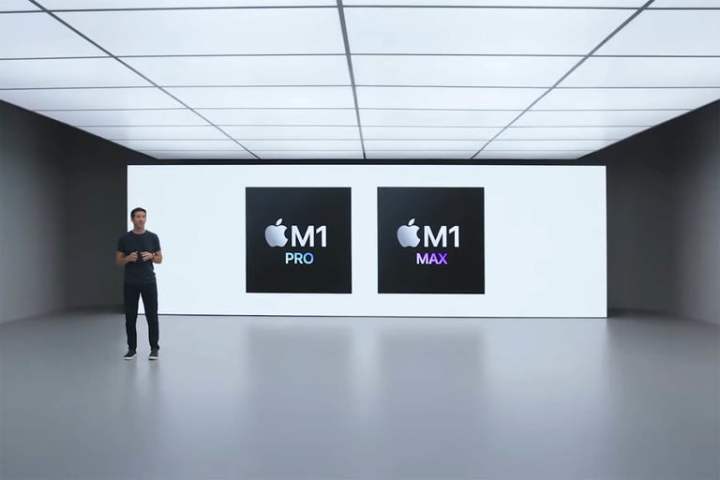
After many months of speculation, we now know Apple’s newest custom silicon as the Apple M1 Pro and Apple M1 Max. This is contrary to previous rumors, which indicated a possible M1X. Both chips are available as options in the new MacBook Pro 14-inch, as well as the MacBook Pro 16-inch. Pricing starts at $2,000, and $2,500, respectively. Both models will be released Tuesday, October 26.
Specs and performance

Let’s get straight to it: The Apple M1 Pro and Apple M1 Max chips are super powerful and are all built on 5-nanometer technology. Compared to the Apple M1 chip, Apple claims that the CPU in M1 Pro and M1 Max can deliver up to 70% faster performance.
That’s because the M1 Pro CPU now has 10 cores, eight of which are for high performance and two of which are efficient cores. The GPU in the M1 Pro, meanwhile, is up to two times faster than the one found on the M1. There’s also a media engine and display engine built into the M1 Pro to benefit 4K and 8K video streams. The display engine has additional Thunderbolt controllers, which power the support for two external displays.
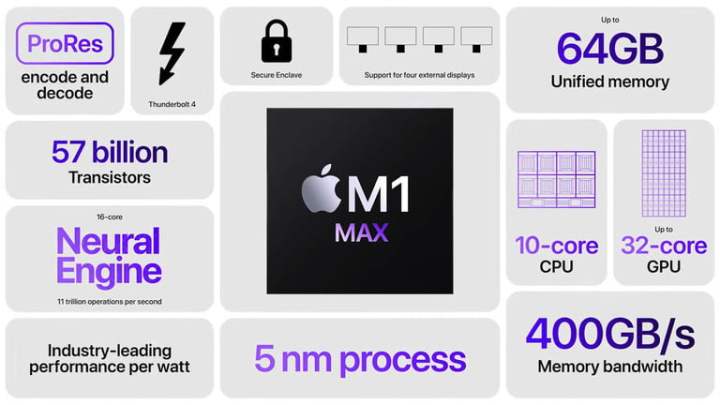
As for other under-the-hood changes, Apple mentioned that the M1 Pro’s 16-core GPU is two times faster than the one found on the standard M1 and up to seven times faster than the integrated graphics on the latest 8-core Intel processor found on the MSI GP66 Leopard Windows laptop. The M1 Pro CPU can also be configured with up to 32GB of fast unified memory and up to 200GBps of memory bandwidth.
All of that comes with no sacrifice to the battery. Apple claims that M1 Pro delivers up to 1.7x more CPU performance at the same power level and achieves the PC chip’s peak performance using up to 70% less power.
As for the M1 Max, things get even better. The M1 Max is all about GPU power. It features the same powerful 10-core CPU as the M1 Pro but adds a massive 32-core GPU. That can add up to four times faster graphics performance when compared to the M1 chip. Note that the M1 Max also has 57 billion transistors — making it the largest chip Apple has ever built. M1 Max CPUs can also be configured to 64GB of fast unified memory.
When it comes to battery power on that M1 Max, Apple claims that the GPU delivers performance comparable to a high-end GPU in a compact pro PC laptop, but with 40% less power. Performance should also be similar to that of the highest-end GPU in the largest PC laptops while using up to 100 watts less power.
The chips aren’t here yet, but leaked benchmarks have offered a glimpse at performance. For the CPU, a leaked result from Geekbench showed the M1 Max MacBook Pro outperforming the last year’s M1 MacBook Pro by 56% in multi-core performance. The single-core result is roughly the same, though — the M1 and M1 Max feature the same cores under the hood, after all. The real bump is multi-core, which is where the M1 Max shows its strength.
Although CPU performance is up, the M1 Max received a big GPU upgrade. And leaked benchmarks back up Apple’s claims of outperforming the best laptop graphics cards available today. Results from GFXBench place the M1 Max on the level of an RTX 3080 mobile or RX 6800M graphics card, which are the two most powerful laptop graphics cards on the market.
We need to wait until the M1 Pro and M1 Max are here before making any concrete claims about performance. These are leaked benchmarks, so we recommend treating them as such. Still, the two chips are shaping up to bring a big bump in power to the MacBook Pro, with solid CPU gains and off-the-charts GPU performance.
How long will the battery last?
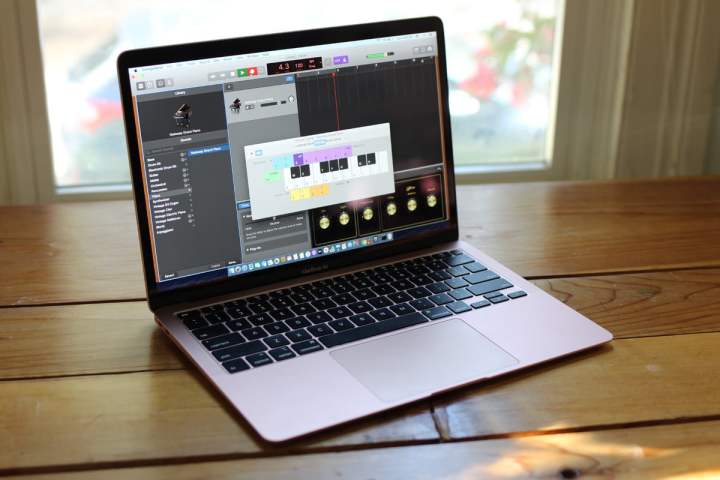
A key consideration for any laptop is battery life, and Apple’s M1 MacBooks perform brilliantly here. In our reviews, the M1 MacBook Pro 13 hit well over 16 hours of light web browsing and 21 hours of video playback. The M1 MacBook Air, meanwhile, managed 15.5 hours and 18.5 hours in the same tests.
That was absolutely miles ahead of Apple’s previous Intel-based MacBooksm and the new M1 Pro and M1 Max take that to new levels. Apple claims that you can expect up to 17 hours of battery life for video playback on 14-inch MacBook Pro models — a full 6 hours more than before on 13-inch Apple M1 MacBooks. Meanwhile, on the 16-inch model, you can expect up to 21 hours of battery life — 10 hours more than an Intel-based Mac.
Apple also claims that thanks to improved battery life, developers working in Xcode will be able to compile up to 4x as much code. It also claimed that photographers on the go will get up to 2x longer battery life in Adobe Lightroom Classic when editing images.
Fixing the Mac’s port weakness
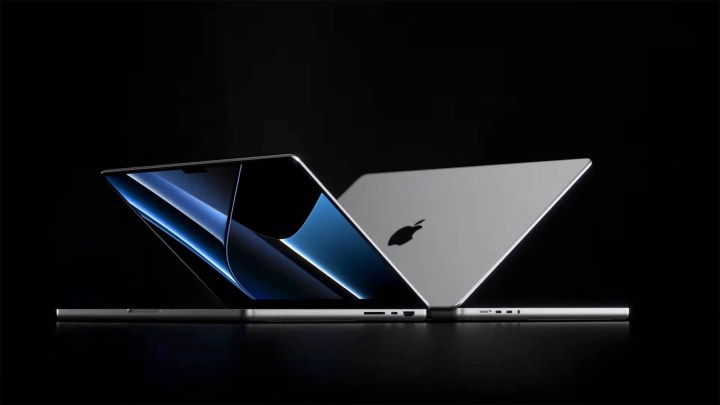
As much of an upgrade the M1 was over anything Apple could previously offer, it had one major drawback. Every M1 Mac, be that the MacBook Pro or the 24-inch iMac, can only offer two Thunderbolt 3 slots.
The M1 Pro and M1 Max Macbook models, though, swap things up a bit. All Macbook models with these new Apple processors come with a wide set of ports. You’ll find a full-size SDXC card slot, an HDMI port, and a 3.5 mm headphone jack, as well as Three Thunderbolt 4 USB-C ports and a MagSafe 3 charger port.
Unlike previous Macbooks, there’s a single Thunderbolt 4 port on the right side of the laptop, and dual Thunderbolt 4 ports on the other side. You can charge up the laptop with Magsafe 3, as well as USB-C. Do note, though that a USB-C charger is included in the box, so MagSafe is optional and will be an extra purchase.


